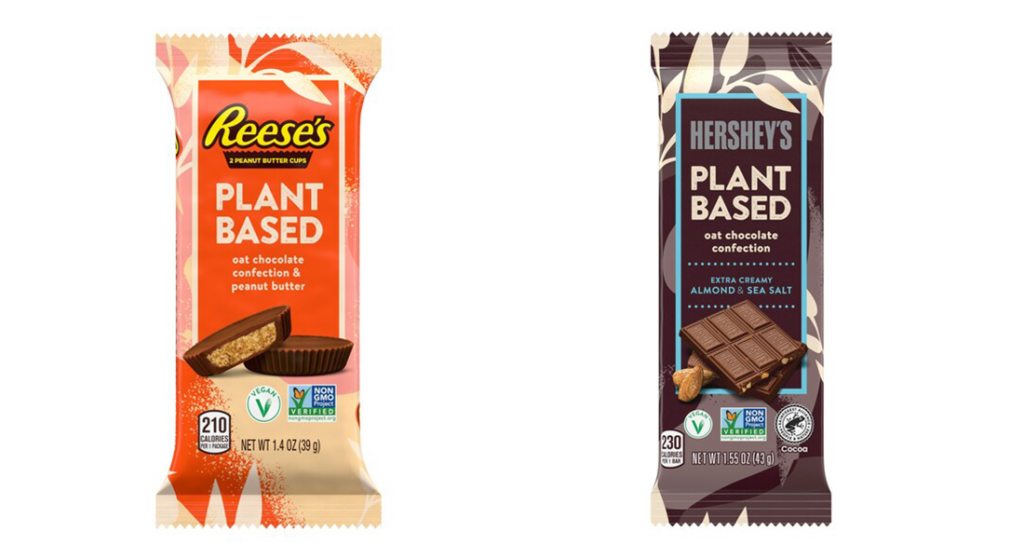Hershey, the maker of Reese’s, Hershey bars, Kisses and other chocolates and candies, announced two new plant-based products earlier this week: Reese’s Plant Based Peanut Butter Cups and Hershey’s Plant Based Extra Creamy with Almonds and Sea Salt. The new vegan sweets are both made with oat milk instead of cow’s milk and are designed to taste like milk chocolate.
“We are excited to introduce these delicious, plant-based options,” said Teal Liu, brand manager of Better For You, The Hershey Company, in a press release. “Our purpose is to create more moments of goodness for consumers. Those moments are now more accessible for chocolate lovers looking for plant-based alternatives.”
The Reese’s Plant Based Peanut Butter Cups will be available nationally this month, while the Hershey bars will be hitting the shelves in April. Although Hershey has not released all the nutritional information for the new products, a pack of two Plant Based Peanut Butter Cups has the same number of calories (210 calories) as a regular two-pack of Reese’s Peanut Butter Cups.
Related: Hershey’s Organic Reese’s Peanut Butter Cups Tap Into Better-for-You Branding
The plant based peanut butter cups and Hershey bars will be the first vegan chocolates that the company has sold across the US. However, Hershey has experimented with plant-based chocolate in the past. It sold an oat-based chocolate bar called Oat Made in some test markets starting in 2021, but those products were never distributed beyond test markets.
Hershey said it developed the new plant based peanut butter cups and Hershey bars — some of its most popular products — because there’s a lack of mainstream plant-based chocolates in the US market. The company added that consumers want choice and are looking for products they consider healthier or with fewer ingredients, including reduced sugar and plant-based options.
Hershey, alongside a number of other chocolate producers including Nestlé and Cadbury, has been expanding its range of products to keep up with the growing demand for dairy-free chocolate. In 2021, Nestlé introduced KitKat V, a vegan version of the chocolate bar, and Mondelez acquired Hu, a vegan chocolate company, that same year.
Whether consumers are looking to reduce consumption of animal-based products for health or environmental reasons, the plant-based chocolate market has reached staggering heights in recent years. According to Future Market Insights, the vegan chocolate market was valued at $1 billion in 2022 and is projected to reach $4 billion by 2032 at a compound annual growth rate (CAGR) of 15.5 percent.
Any market of this size is bound to be competitive, with key players including Hershey, Mondelez, Lindt, Ritter Sport, Nestlé and Cadbury accounting for a large share of the market. These brands have captured the market through joint ventures, partnerships and mergers and acquisitions, while keeping up with research and development internally to launch new and innovative products.
While Hershey has not specified whether the vegan products will cost more than regular chocolates, the plant-based versions will most likely cost more. Currently, Rite Aid lists a package of two Reese’s Plant Based Peanut Butter Cups at $2.49, about $1 more than consumers would pay for a regular package. Hershey charges a similar premium for organic versions of its Reese’s Cups, which went on sale in 2021.












Join or login to leave a comment
JOIN LOGIN